The University of Macau (UM) has made remarkable progress over the past two decades, with its international reputation and international rankings both rising steadily. To accelerate the internationalisation of higher education in Macao, UM constantly expands its international network and establishes new platforms for international research collaboration. Additionally, the university has devised a global strategy to cope with the new challenges faced by the higher education sector. ‘We have our roots in Macao and need to be better integrated with the Greater Bay Area and the entire China. With all these in mind, we can then go global,’ says Prof Rui Martins, vice rector (global affairs) of UM.
A New Strategy in Action
UM is ranked in the 301-350 bracket in the Times Higher Education (THE) World University Rankings 2020, with a global ranking of No 9 in International Outlook. It has established partnerships with 230 academic institutions in 32 countries and regions. To further expand its international network, UM has devised a new global strategy, which can be summed up with four words that begin with ‘S’ – Strategic, Substantial, Specific, and Sustainable. Essentially, the strategy supports organised and stable platforms and partnerships that serve the strategic goals of the university and Macao, instead of pursuing cooperation on a random basis.
Collaborate to Educate
UM is ramping up its efforts to become a centre for technological innovation and a personnel training base in the west of the GBA. In March, UM began building its first industry-education-research demonstration base in mainland China, on Hengqin Island in Zhuhai. Furthermore, the university creates and participates in alliances with partners across the GBA, including the Guangdong-Hong Kong- Macao University Alliance and the Alliance for Technological Innovation and Talent Development in Western GBA.
As for partnerships with other parts of China, UM launched a ‘2+4’ medical programme together with Zhejiang University in 2018, and signed an agreement in January this year with Tsinghua University on joint postdoctoral training. UM has also established a platform for the commercialisation of new technologies in Chinese medicine on Hengqin Island, in collaboration with Peking University’s State Key Laboratory of Natural and Biomimetic Drugs and the Guangdong-Macao Traditional Chinese Medicine Science and Technology Industrial Park, as well as a Ministry of Education joint key laboratory together with Sun Yat-Sen University’s Laboratory of Bioinorganic and Synthetic Chemistry.
Ties with Portuguese-speaking Countries
Since its founding, UM has been playing a unique role in bridging Macao with Portuguese-speaking countries. Between 2014 and 2017, UM was the president of the Association of Portuguese Speaking Universities (AULP). UM is still a member of the board, maintaining good relationships with universities in Brazil, Portugal and other Portuguese- speaking countries. According to Prof Martins, UM is planning a dual doctoral degree in the Portuguese language with the University of São Paulo, and is also exploring opportunities with the University of Campinas, which is ranked second in Brazil.
Many students from Portuguese-speaking countries choose UM to study law because of the close ties between Macao’s legal system and that of their home countries. For instance, Jorge Carlos Fonseca, the incumbent president of the Republic of Cabo Verde, was an associate professor in the Faculty of Law three decades ago. According to Prof Martins, many students from these countries come to study at UM every year. After returning to their countries, many of them serve in important positions such as high court judges and law professors.
In fact, UM’s cooperation with these countries has expanded to areas like engineering, health sciences, and nanotechnology. For instance, UM has been working with the International Iberian Nanotechnology Laboratory in Braga in Northern Portugal since 2018. Earlier this year, the first joint scientific paper from this collaboration was published, and more outcomes are expected.
In 2019, a UM delegation visited renowned universities in Portugal, including the University of Lisbon, the University of Coimbra, the University of Porto, and the University of Minho, in order to strengthen collaboration. The delegation also visited Manuel Heitor, minister of science, technology, and higher education of Portugal.
Setting Sights on the UK
Also at the core of UM’s global strategy is its relationships with English-speaking countries, especially the United Kingdom. ‘We’d like to have wider collaborations with top universities there, like Imperial College London, the University of Edinburgh, the University of Bath, and others, in different areas of knowledge,’ says Prof Martins.
In 2019, important steps like a memorandum of understanding with Imperial College London – signed in May – are opening up new opportunities for UM students and researchers. The agreement sets a framework for UM’s ‘1+3 PhD scheme’, through which outstanding postgraduate students at UM will have the opportunity to undertake a one-year master’s programme at Imperial College during their PhD study at UM.
Earlier this year, UM signed similar MOUs with the University of Bristol and the University of Edinburgh, respectively. In recent years, UM has also been working with reputable universities in other English- speaking countries such as the University of Toronto in Canada and Temple University in the United States. Prof Martins also notes that, while most students of UM’s Honour’s College (HC) can choose to study for one semester or during the summer at notable universities in the United States or Portugal, opportunities with British universities will be created soon.
Source: UMagazine Issue 21
Related Articles: UM and Macao over the Past 20 Years Internationalisation through New PositioningNew Research Blueprint to Meet Global Trends Supporting Macao’s Development with Whole-person Education Creating an Environment to Support the University’s Development
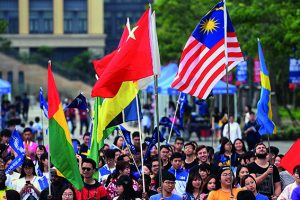
UM constanlty expands its international network
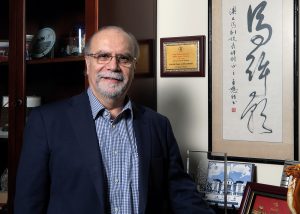
UM’s Vice Rector (Global Affairs) Prof Rui Martins
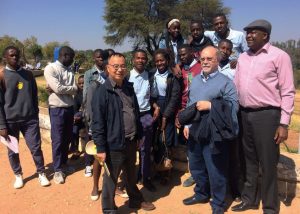
Rector Yonghua Song and Vice Rector Rui Martins visit Angola to strengthen ties with lusophone universities
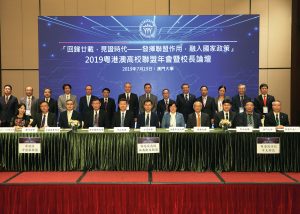
The Alliance for Technological Innovation and Talent Development in Western GBA was founded at UM in August 2019
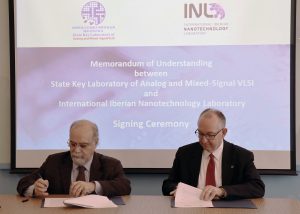
UM has been working with the International Iberian Nanotechnology Laboratory in Braga, Northern Portugal, since 2018
